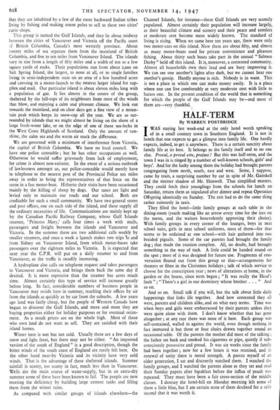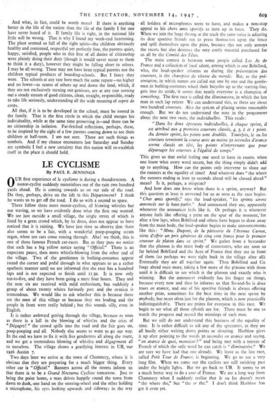HALF-TERM
By WARREN POSTBRIDGE
IWAS staying last week-end at the only hotel worth speaking of in a small country town in Southern England. It is not in hotels that one expects to get a glimpse into family life. One hardly expects, indeed, to get it anywhere. There is a certain sanctity about family life at its best. It belongs to the family itself and to no one else. Procul, o procul este, profani ! But this was half-term, and the town I was in is ringed by a number of well-known schools, girls' and boys'. And for the lucky among them the holiday had brought parents congregating from north, south, east and west. Some, I suppose, came by train, a surprising number by car in spite of Mr. Gaitskell and the sinister shadow of Mr. Shinwell. That simplified matters. They could fetch their younglings from the schools for lunch on Saturday, return them as stipulated after dinner and repeat Operation Offspring identically on Sunday. The rest had to do the same thing rather ruinously in taxis.
They filled the hotel—little family groups at each table in the dining-room (youth making like an arrow every time for the ices on the menu, and the waiters benevolently approving their choice). With family groups in every corner of the lounges, boys in neat school suits, girls in neat school uniforms, most of them—for that seems to be ordained at one school—with hair gathered into two braided pigtails. Some of the car parents had brought the family dog ; that made the reunion complete. All, no doubt, had brought something in the way of tuck. A little could be handed round on the spot ; most of it was designed for future use. Fragments of con- versation floated out from this group or that—arrangements for theatres or films in thi Christmas holidays ; talk of which service to choose for the conscription year ; news of alterations at home, in the garden or the house, _since term began ; " It was really the Head's fault " ; " There's a girl in our dormitory whose brother . . . " And soon.
And so on. Small talk if you will, but the talk about little daily happenings that links life together. And how contented they all were, parents and children alike, and on what easy terms. Time was when boys and girls were embarrassed by their parents unless they were quite alone with them. I don't know whether that has gone altogether ; at any rate there was none of it here. Each group was self-contained, walled in against the world, even though nothing in fact immured it but three or four chairs drawn together round an occasional table. Of the parents the mother did most of the talking ; the father sat back and smoked his cigarettes or pipe, quietly if sub- consciously possessive and proud. It was six weeks since the family had been together ; now for a few hours it was reunited, and in renewal of unity there is moral strength. A parent myself of an older generation, I sat and discreetly watched them. I watched the family groups, and I watched the parents alone as they sat and read their Sunday papers after breakfast before the influx of youth was repeated. They must have been a fair cross-section of the middle classes. I daresay the hotel-bill on Monday morning left some of them a little blue, but I am certain none of them doubted for a split second that it was worth it.
And what, in fact, could be worth more? If there is anything better in the life of the nation than the life of the family I for one have never heard of it. • If family life is right, in the national life little will be wrong. That is why I found my week-end heartening. The place seemed so full of the right spirit—the children obviously healthy and contented, respectful yet perfectly free, the parents quiet, happy, satisfied, people who in this first of all duties of citizenship were plainly doing their duty (though it would never occur to them to think it a duty), however they might be falling short in others. I may be all wrong. These may not have been typical parents nor the children typical products of boarding-schools. But I fancy they were. The schools at any rate bore much the same repute—no higher and no lower—as scores of others up and down the land, which, if they are not exclusively turning out geniuses, are at any rate turning out a steady stream of good citizens, clean, straight, responsible, ready to take life seriously, understanding all the wide meaning Of esprit de corps.
All that, if it is to be developed in the school, must be rooted in the family. That is the first circle in which the child merges his individuality, while at the same time preserving it—and there can be no citizenship in isolation. Far-fetched reflections, perhaps, these, to be inspired by the sight of a few parents coming down to see their children at half-term. I am not sure. There are such things as symbols. And if my chance encounters last Saturday and Sunday are symbolic I feel a new certainty that this nation will re-establish itself in the place it should hold.































 Previous page
Previous page